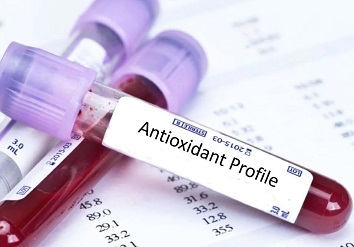COVID-19 Research: Study By Hungarian Scientists Finds That Serum Antioxidant Levels Can Be Used To Predict COVID-19 Severity
Thailand Medical News Team Aug 20, 2023 2 years, 6 months, 5 days, 3 hours, 54 minutes ago
COVID-19 Research: The COVID-19 pandemic, caused by the novel coronavirus SARS-CoV-2, has led to a global health crisis with varying levels of disease severity among patients. Researchers from the University of Pécs in Hungary conducted a study to explore potential predictive markers for the severity of COVID-19. Oxidative stress, an imbalance between harmful reactive oxygen species and the body's antioxidant defenses, has been implicated in the progression of the disease. The researchers focused on the serum's total antioxidant capacity (TAC) and a new parameter, the TAC/lymphocyte ratio, to assess their potential as predictive markers.
 Understanding the Study
Understanding the Study
The study involved 61 COVID-19 patients, including those in regular wards and intensive care units (ICUs), along with 29 healthy controls. The study team measured serum TAC levels using a specialized chemiluminescence microplate assay. They observed that ICU patients had higher TAC levels compared to ward patients and controls, indicating a potential link between TAC and disease severity.
Linking Oxidative Stress to COVID-19
Oxidative stress has emerged as a significant factor in the development of severe COVID-19 symptoms. The study team noted that oxidative stress contributes to cellular damage and organ failure, especially in the context of the hyperinflammatory loop observed in the disease's progression. The level of oxidative stress might also explain the higher susceptibility of males to severe COVID-19 due to their higher oxidative stress levels.
Novel Marker: TAC/Lymphocyte Ratio
In addition to TAC levels, the study team introduced a novel parameter, the TAC/lymphocyte ratio. Lymphopenia, a decrease in lymphocyte counts, is commonly observed in COVID-19 patients. The ratio was proposed as a potential marker due to its correlation with oxidative stress and disease severity. The study revealed that both TAC levels and the TAC/lymphocyte ratio demonstrated significant predictive value for assessing the severity of COVID-19.
Potential Clinical Applications
The study's findings have important implications for COVID-19 management and prognosis. The TAC levels and TAC/lymphocyte ratio could serve as valuable tools for predicting disease severity, acute kidney injury (AKI), and even mortality. The researchers found that the TAC/lymphocyte ratio, in particular, showed promise in predicting mortality rates among COVID-19 patients.
Comparing with Previous Research
The study's outcomes were compared with previous research on antioxidant levels in COVID-19 patients. Various studies using different assays yielded inconsistent results regarding serum TAC levels. This discrepancy highlights the importance of standardized assays to accurately measure antioxidant capacity.
Limitations and Future Directions
While the
COVID-19 Research provided valuable insights, it had limitations, such as a relatively small sample size and the absence of antioxidant enzyme measurements. The study team also acknowledged the n
eed for further validation in larger clinical studies. Additionally, the potential interchangeability of the TAC/lymphocyte ratio with the uric acid/lymphocyte ratio warrants further investigation.
Conclusion
The study conducted by Hungarian scientists at the University of Pécs sheds light on the role of oxidative stress in COVID-19 severity. Serum total antioxidant capacity (TAC) and the novel TAC/lymphocyte ratio emerged as promising predictive markers for disease severity, acute kidney injury, and mortality. The findings suggest that assessing oxidative stress levels in COVID-19 patients could contribute to better management and treatment strategies. Further research is needed to validate these markers and explore their clinical applications in larger patient cohorts.
The study findings were published in the peer reviewed International Journal of Molecular Sciences.
https://www.mdpi.com/1422-0067/24/16/12935
For the latest
COVID-19 Research updates, keep on logging to Thailand Medical News.
